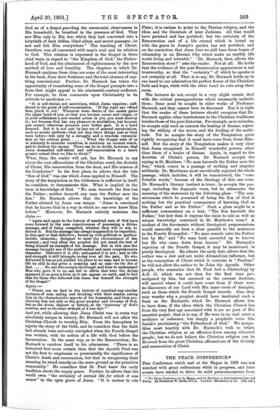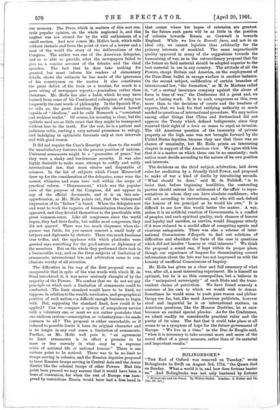THE PEACE CONFERENCE.*
THE Conference which met at the Hague in 1899 was not watched with great enthusiasm while in progress, and later events have tended to drive its mild pronouncements from • The Peace Conference at the Hague, and its Bea s on International Law and Policy. By Frederick W. Hollis, D.C.L. London : Macmillan St Co. [10a. net.]
our memory. The Press, which in matters of this sort con- trols popular opinion, on the whole neglected it, and this neglect was not atoned for by the wild enthusiasm of a small section. And now comes Mr. Rolls's book, which tells without rhetoric and from the point of view of a lawyer and a man of the world the story of the deliberations of the Congress. The author was one of the American delegates, and so is able to provide, what the newspapers failed to give us, a concise account of the debates and the chief speeches. The fact that he dare take nothing for granted, but must inform his readers of elementary details, shows the estimate he has made of the ignorance of his countrymen on the matter. It also constitutes the great defect of the book as a treatise, for much is a mere string of newspaper reports,—journalism rather than literature. Mr. Rolls has also a habit, which he may have learned from some of his Continental colleagues, of using too frequently the cant words of philosophy. In the Spanish War, he tells us, the great American Republic showed herself capable of " idealism," and he calls Bismarck a " consistent and reckless realist." Of course, his meaning is clear, but the epithets used are so little exact that they might be transposed without loss to the truth. For the rest, he is a patient and judicious critic, curbing a very natural proneness to eulogy, and indulging in optimistic forecasts only at rare intervals and with good reason.
It did not require the Czar's Rescript to show to the world the unsatisfactory features in the present position of nations. Universal armaments might be a "guarantee of peace," but they were a shaky and burdensome security. It was also highly desirable to make some attempt to codify and ratify international law, that most elusive and disputable of sciences. In the list of subjects which Count Mouravieff drew up for the consideration of the delegates, some were the merest whimsies and some were well within the scope of practical reform. " Disarmament," which was the popular view of the purpose of the Congress, did not appear in any of the official documents, and it is on this mis- apprehension, as Mr. Rolls points out, that the widespread impression of its "failure " is based. When the delegates met and went to work the vagaries of humanitarian theorists dis- appeared, and they devoted themselves to the practicable with great common-sense. Like all congresses since the world began, they had their faults; but unlike most congresses, they did not quarrel. There was too much eloquence when elo- quence was futile, for you cannot convert a small body of lawyers and diplomats by rhetoric. There was much fussiness over trifles, and the applause with which platitudes were greeted says something for the good-nature or diplomacy of the members. But on the whole they performed their task in a businesslike way, and on the three subjects of limitation of armaments, international law, and arbitration came to con- clusions worthy of all attention.
The difficulties in the way of the first proposal were so insuperable that in spite of the wise words with which M. de Steal introduced it, it was never seriously thought of by the majority of the Powers. We confess that we do not see any principle on which such a limitation of armaments could be conducted. The limit standard would have to be fixed, we suppose, in relation to the wealth, territories, and geographical position of each nation,—a difficult enough business to begin with. But, supposing the standard fixed, how could it be applied ? Can we compare a system of compulsory service with a voluntary one, or must we not rather postulate that one uniform system—conscription or voluntaryism—be made common to all P The proposal is either unworkable, or if reduced to possible limits it loses its original character and is no longer in any real sense a limitation of armaments. Further, as Mr. Rolls well puts it, " an agreement to limit armaments is in effect a promise to be more or less unready in what may be a supreme crisis of national life or national honour." There is one curious point to be noticed. There was to be no limit to troops serving in colonies, and the Russian deputies proposed to treat Russian troops serving in Central Asia and the Amur district like the colonial troops of other Powers. Had this point been pressed we may assume that it would have been a bone of contention, for when the rest of Europe was ham pered by restrictions Russia would have had a free hand in that corner where her hopes of extension are greatest. In the future such parts will be as little in the position of colonies towards Russia as Cornwall is towards England. While we live in Bromuli faece, and not in an ideal city, we cannot legislate thus arbitrarily for the primary interests of mankind. The same impracticable quality appeared in many of the suggestions towards the humanising of war, as in the extraordinary proposal that for the future no field material should be adopted superior to the best material in use in any country. The attitude of all the Powers, except Britain and America, on the employment of the Dum-Dum bullet in savage warfare is another instance. On the second subject, codification of certain branches of international law, "the formation," as IL de Martens called it, " of a mutual insurance company against the abuse of force in time of war," the Conference did a great and, we trust, a lasting work. It is to such congresses as this, even more than to the decisions of courts and the treatises of experts, that we look for that ratifying authority so much needed in questions of international procedure. We may notice among other things that China and Switzerland did not approve the Treaty which defined belligerents, since they reserved their right of a /cage en masse to repel an invasion. The old American question of the immunity of private property on the high seas was not brought forward by the United States deputies, because they saw that there was no chance of unanimity, but Mr. Rolls prints an interesting chapter in support of the American view. We agree with him that it is a matter on which there can be no unanimity; each nation must decide according to the nature of its own position and interests.
The decisions on the third subject, arbitration, laid down rules for mediation by a friendly third Power, and proposed to make of war a kind of duello by introducing seconds. " What should be done," said M. de Nelidoff, " is to insist that, before beginning hostilities, the contending parties should entrust the settlement of the affair to repre- sentatives in whom they can have absolute confidence ; who will act according to instructions, and who will each defend the honour of his principal as he would his own." It is difficult to see how this would better the matter. A war, unless it is an artificial creation of Governments, is a conflict of peoples, and such spiritual quality, such chances of honour and loyalty and sacrifice, as survive, would disappear utterly if it were reduced to a sordid affair of competing agents and vicarious antagonists. There was also a scheme of inter- national Commissions d'Enquae to find out solutions of difficulties and elucidate the facts of the case in questions which did not involve " honour or vital interests." We think the proposal a sound one, if kept within its proper place, though our experience of leagues for disseminating correct information about the late war has not impressed us with the honesty of unofficial Commissions of Inquiry.
Mr. Rolls has given us a clear and full summary of what was, after all, a most interesting experiment. He is himself an optimist, but he is no thin cosmopolitan, but a believer in the " unimpaired sovereignty " of each State and the trans- cendent claims of patriotism. We have found scarcely a sentence of his own to which we would wish to demur. Sometimes he would seem to push pure reason and philan- thropy too far, but, like most American publicists, however aloof and impartial he is on international matters, on American questions, like the Monroe Doctrine, he at once becomes an excited special pleader. As for the Conference, we admit readily its considerable practical value and the purity of its aims. The fact that it could take place at all seems to us a symptom of hope for the future government of Europe. " We live in a time," as the Duc de Broglie said, " when it is necessary to take account more and more of the moral effect of a great measure, rather than of its material and important results."







































 Previous page
Previous page